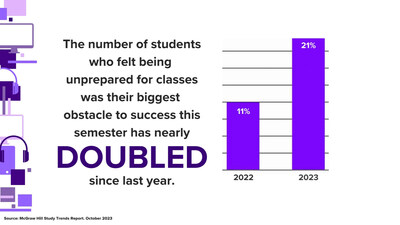New Report Finds Sharp Increase in Students Naming Unpreparedness for Courses as Greatest Obstacle to Success
Oct 24, 2023
- One in three instructors said all or most of their students were unprepared for their courses because of COVID-related learning loss, new McGraw Hill Study Trends Report finds
- Over 80% of students have turned to ChatGPT or social media for study help
COLUMBUS, Ohio, Oct. 24, 2023 /PRNewswire/ -- Today, McGraw Hill announced the release of its second annual McGraw Hill Study Trends Report examining student and instructor opinions on changing study habits, mental health concerns, student use of digital tools and more. The survey, conducted by Morning Consult on behalf of McGraw Hill, shows that while the pandemic may seem to be in the rearview mirror, the impact of learning loss on students is still gaining strength. The survey showed a sizable increase in the number of students who indicate that feeling unprepared for courses heading into the semester is the biggest obstacle to their success – up from 11% to 21% since last year. One in five students also report that learning loss caused by the pandemic has had a negative impact on their education and college preparedness.
The McGraw Hill Study Trends Report captured the views of over 500 U.S. undergraduate students and 200 college instructors on how study habits have evolved since the pandemic began. The study also found that students are increasingly turning to social media and emerging generative AI tools to supplement their course materials, with an overwhelming majority of students (80%) using ChatGPT and social media for study help.
"The survey's findings emphasize the need for creative solutions to address learning loss and related challenges and to support educators during this time of rapid change," said Simon Allen, CEO of McGraw Hill. "We are committed to serving learners along their individual journeys, meeting them where they are and adapting our approach to serve their evolving preferences and needs."
Students' Struggles are a Growing Challenge on College Campuses
Current college freshmen spent significant portions of their formative high school years dealing with COVID-related disruptions and the impact of learning loss is manifesting as students are now struggling to handle the rigorous academic demands of higher education.
Professors are observing this as well, reporting that levels of unpreparedness due to COVID-19-related learning loss are even worse than students themselves might realize. One-third of instructors reported that all or most of their students struggled due to being unprepared, while only 21% of students reported struggles for this reason. This lack of preparedness is reported as the most common obstacle to students' success, according to the educators surveyed.
These academic struggles highlight a growing need for mental health resources within higher education institutions:
- Increased responsibilities, lack of free time and COVID-related disruptions have taken a toll on the mental health of today's college students. A majority of students reported regularly feeling overwhelmed (57%) and stressed (56%) because of their studies.
- More than one in three (35%) of students said they had considered dropping out as a result of the difficulties they experience when studying, up from 26% in last year's survey.
- Professors share this concern, with 90% agreeing that mental health is a growing challenge affecting undergraduate student success.
- Nearly one in four professors (24%) feel that they lack adequate resources from their institutions to effectively support students with mental health challenges.
Both Students and Professors Are Embracing Generative AI And Optimistic About Its Potential To Support Learning
Faced with rigorous courses, students are looking for tools that can support them through their study experiences and maximize their productivity during the hours they can dedicate to studying. Two thirds of students say they had to choose between schoolwork and obligations outside of school, which is a significant increase over 59% last year.
Students widely express the desire for study materials that align with the convenience and engagement of social media. Over 70% of students say they would study more, and more effectively, if their study materials were more like social media. And both students and educators are actively exploring the potential of generative AI chatbots like ChatGPT to bolster comprehension, seeking ways to navigate the challenges of modern learning. One in three students report using AI chatbots for schoolwork in the past year.
But these self-curated online materials are imperfect stopgaps, and students and instructors are aware of those flaws, especially when it comes to accuracy and trustworthiness. 46% of instructors and 39% of students express that they would be more comfortable using AI tools for coursework if the tools' content were developed and vetted by trusted academic sources.
Justin Singh, Chief Transformation and Strategy Officer for McGraw Hill, remarked on this innovative approach, stating, "Students' learning needs are in constant flux, and they increasingly seek technology that mirrors the engaging, convenient format of tools and technology they use in their daily lives like ChatGPT and social media. We must respond to those preferences while also meeting the high standard for accuracy and trustworthiness that content providers like McGraw Hill are known for."
Survey Methodology
Morning Consult conducted 500 online interviews of undergraduate students and 200 college instructors between July 18th and August 11th, 2023, on behalf of McGraw Hill. The margin of error for students is +/-4% and for instructors it is +/-7%. Margin of error is greater for subgroups of either audience. Care has been taken to match the known composition of the undergraduate population on age, gender, race, region, and part-time or full-time student status.
About McGraw Hill
McGraw Hill is a leading global education company that partners with millions of educators, learners and professionals around the world. Recognizing their diverse needs, we build trusted content, flexible tools and powerful digital platforms to help them achieve success on their own terms. Through our commitment to equity, accessibility and inclusion, we foster a culture of belonging that respects and reflects the diversity of the communities, learners and educators we serve. McGraw Hill has over 40 offices across North America, Asia, Australia, Europe, the Middle East and South America, and makes its learning solutions for PreK–12, higher education, professionals and others available in more than 80 languages. Visit us at mheducation.com or find us on Facebook, Instagram, LinkedIn, or Twitter.
Tyler Reed
McGraw Hill
(914) 512-4853
tyler.reed@mheducation.com
SOURCE McGraw Hill


